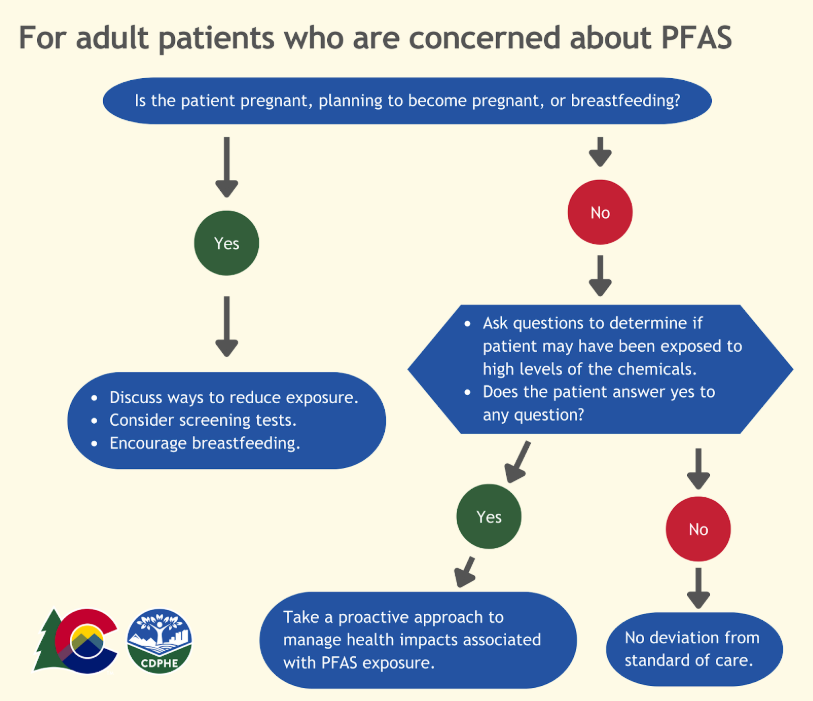A guide for health care providers: Addressing PFAS concerns

Per- and polyfluoroalkyl substances (PFAS) are a group of many-thousand human-made chemicals that are pervasive in our environment. They are persistent, bioaccumulative, and some are associated with health effects in humans and animals. Almost every person living in the United States has some amount of PFAS in their blood, but higher levels are associated with a greater risk of certain health effects.
PFAS’ effects on human health receive a lot of media attention, and your patients may ask about these chemicals. Here are some tips on listening to their concerns, assessing their risk, and helping them manage potential health issues.
Drinking water standards for PFAS
In April 2024, the U.S. Environmental Protection Agency (EPA) established legally enforceable standards, called Maximum Contaminant Levels (MCLs), for six PFAS in drinking water. Five contaminants (PFOA, PFOS, PFHxS, PFNA, and HFPO-DA) have individual MCLs, and PFAS mixtures containing two or more of PFHxS, PFNA, HFPO-DA, and PFBS are regulated using a Hazard Index to account for the combined and co-occurring levels of these PFAS in drinking water. EPA also finalized health-based, non-enforceable Maximum Contaminant Level Goals (MCLGs) for these PFAS.
| Compound | Final MCLG | Final MCL (enforceable levels) |
|---|---|---|
| PFOA | Zero | 4.0 parts per trillion (ppt) |
| PFOS | Zero | 4.0 ppt |
| PFHxS | 10 ppt | 10 ppt |
| PFNA | 10 ppt | 10 ppt |
| HFPO-DA (commonly known as GenX Chemicals) | 10 ppt | 10 ppt |
| Mixtures containing two or more PFHxS, PFNA, HFPO-DA, and PFBS | 1 (unitless) Hazard Index* | 1 (unitless) Hazard Index |
*CDPHE uses this private well water tool to examine the health risks when exposed to this PFAS mixture.

Not all people have the same risk. Age, gender, health history, lifestyle and other factors also play a role in how exposure to PFAS impacts individual health.
Vulnerable populations
- Children ages 0-5 years.
- People who are pregnant, planning to become pregnant, or breastfeeding.
- People who live in highly contaminated communities.
- People who have occupational exposures.
There is strong evidence that some PFAS:
- Affect the immune system.
- Decrease infant birth weight.
- Increase cholesterol.
- Increase risk of kidney cancer.
There is moderate evidence that some PFAS:
- Increase risk of preeclampsia and high blood pressure during pregnancy.
- Impact liver enzymes.
- Effect thyroid hormones.
- Increase risk of ulcerative colitis.
- Increase risk of testicular cancer and breast cancer.
The weight of evidence can change, depending on the agency doing the research. The science around PFAS is always changing. The weight of evidence for some health effects may increase while others decrease.
Follow routine standards of care for individuals who have not been highly impacted by PFAS, and use these guidelines to assess potential impact.
A yes answer to any question indicates the possibility of exposure to high levels of PFAS.
- Do you know if you live in an area that has or has had PFAS contamination?
- Do you know the level of PFAS in your drinking water? (Levels above the MCL indicate a potential for risk.)
- Do you now or did you ever use class B aqueous film-forming foam (AFFF) for fire suppression or work in an occupation that frequently uses ski wax?
- Have you ever worked in a factory that made PFAS or used PFAS in manufacturing processes?
For patients with potentially high occupational exposure, consider referring to an occupational health clinician who may be better able to assess exposure and exposure reduction options. For occupational health clinics visit the Association of Occupational and Environmental Clinics directory website.
Screening and monitoring
- Lipid panel (cholesterol, LDL, HDL, triglycerides).
- For highly exposed patients follow American Academy of Pediatrics (AAP) guidelines for high-risk children and American Heart Association (AHA) guidance for high-risk adults.
- Liver function tests.
- Serum creatinine, urine protein, and urine albumin.
- Thyroid tests.
- Regular breast and testicular examinations.
- Ensure adherence to the recommended vaccination schedule, including boosters.
Discuss ways to reduce exposure
- If PFAS levels in drinking water are above the maximum contaminant level, consider treating or finding an alternate source of drinking water
- Limit exposure to PFAS from the diet by:
- Avoiding eating fish and other wildlife caught near areas of known contamination
- Following guidance for homegrown produce near areas of known contamination. Visit our webpage on PFAS and homegrown produce to learn more.
- Reduce exposure to PFAS in consumer products by checking labels for ingredients that include the words “fluoro” or “perfluoro.”
More information for patients
- ATSDR Breastfeeding and PFAS webpage
- PFAS Blood testing factsheet
- Talking to your doctor about PFAS webpage
- National Academies Guidance on PFAS Exposure, Testing, and Clinical Follow-Up
Additional education for providers
Unborn and young children may be the most susceptible to health effects from PFAS, so people who are pregnant, planning to become pregnant, or breastfeeding need special consideration. Discuss how patients can learn about the risks of PFAS and reduce their exposure.
PFAS have a long half-life, so even after exposure reduction efforts by the mother, children and babies may still be exposed during pregnancy or lactation. However, reducing exposure will help ensure a healthier pregnancy and baby in addition to helping patients manage anxiety and stress.
PFAS pass into breastmilk, and patients may be concerned. The Centers for Disease Control and Prevention and the American Academy of Pediatrics recommend people should continue to breastfeed, even when there might be contaminants such as PFAS in their environment.
- For information on reducing your exposure to PFAS, please visit our PFAS and health webpage.
- Health care providers should discuss PFAS testing with patients likely to have a history of elevated exposure.
- Providers who want to order a test should use ICD-10 diagnosis code Z13.88. If ordering a test through Quest, use Test Code 39307 and CPT code 82542.
- Several labs in North America currently offer PFAS blood testing to individuals: AXYS Analytical, EmpowerDX, and Eurofins. AXYS and Eurofins measure PFAS in blood serum. EmpowerDX offers a home finger-prick test. These tests have the same limitations as a physician-ordered test.
The National Academies of Science, Engineering and Medicine offers the following recommendations to the Agency for Toxic Substances and Disease Registry for interpretation of blood testing for the sum of 7 commonly tested PFAS.
Below 2 ng/mL Adverse health effects not expected Between 2 ng/mL and 20 ng/mL Potential for adverse effects, especially in sensitive populations Above 20 ng/mL Increased risk of adverse effects in all populations - Discuss potential benefits and harms of blood testing including:
- Blood testing does not indicate the source or duration of exposure. However, repeated blood testing over time may indicate whether behavior modification was effective (e.g., changing water sources).
- PFAS blood levels do not indicate whether people will experience any specific health outcome.
- Blood tests, and potential clinical follow-up triggered by results, are expensive and may not be covered by insurance.
- Blood testing may result in increased stress/anxiety about potential health effects.
Questions? Contact ToxCall — 303-692-2606 | cdphe_toxcall@state.co.us